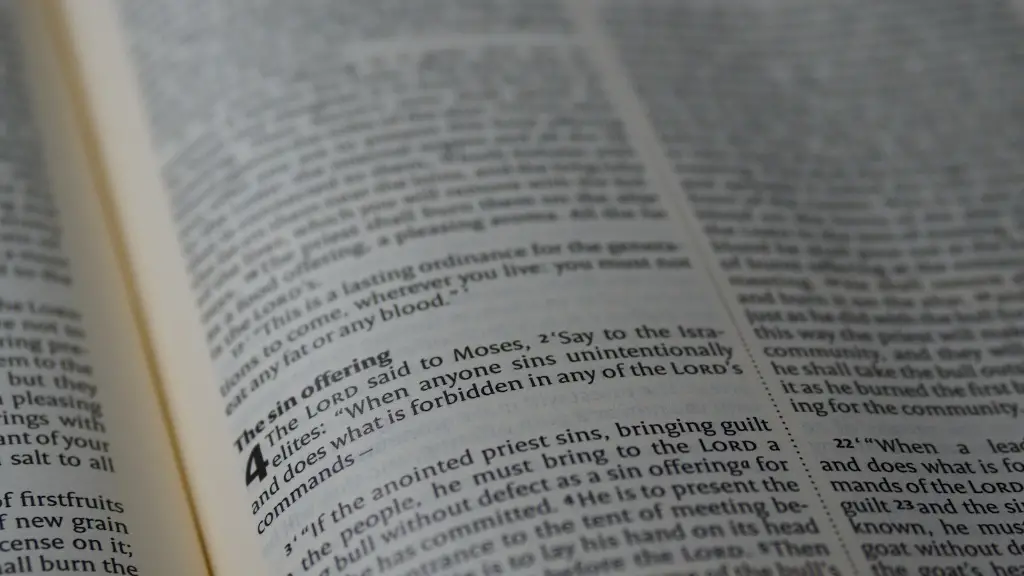Background Information
Writing has been an essential element of human communication since the dawn of history. Scholars often refer to the “beginnings of writing” as the earliest known script, the epigraphic Sumerian language. But ancient records often tell stories of religious texts, books, and laws that were created even further back in time.
Out of all the ancient writings, some of the most widely studied and controversial manuscripts are those referred to as the books of the Bible. For centuries, individuals and organizations have sought to answer the question: “How many writers of the Bible?”
Authorship of Individual Books
One factor to consider when determining how many writers of the Bible exist is the authorship of each book. Many of the books, such as Psalms, are credited to a solitary author, while the Pentateuch (also known as the Torah) is attributed to Moses. Proverbs, Ecclesiastes, and job are other examples of books written by a single author.
But there are books of the Bible which have multiple authors, such as the Gospels. Matthew and Mark likely wrote their books independently of one another, but it is believed that Luke and John had access to each other’s work. This fact is especially evident in the Gospel of John, which mentions many of the same events and characters that are found in the three synoptic Gospels.
In the book of Joshua, it is accepted that the majority of the material was written by Joshua himself, though it is possible that some of the material was added after his death by another author. This view is supported by contemporary Jewish sources, which state that documents from Joshua were gathered and compiled into what we know as the book of Joshua.
Who Collected the Bible?
Another important factor to consider when trying to determine how many writers of the Bible there were is the process of collecting and collating the texts. For example, Ezra the scribe, who lived in the fifth century B.C.E, is credited with playing a major role in collecting and editing the books of the Bible.
Jewish priests also played a major role in the compilation of the bible by ensuring that the books of the Bible were in accordance with the faith’s regulations. They also verified that each book was of suitable literary quality, as they only accepted books that were written in the letter and spirit of their faith.
In addition to the Jewish priests, early Christian scholars also played an important role in the assemblage of the Bible. For example, the Council of Carthage, which was convened in the fourth century CE, declared that the only books accepted by the church were those contained in the Christian Bible at the time.
Perspectives from Scholars
When researching the question of how many writers of the Bible there were, scholars often offer differing opinions. Some scholars believe that Moses’ authorship of the Pentateuch should not be taken literally, arguing that the text is composed of different oral and written traditions and stories.
Other experts believe that the entire bible is the product of different authors and editors, with no single author responsible for the text as a whole. They argue that the bible is the result of a long process of compilation, composition and redaction over many centuries.
Still other scholars assert that although the bible may or may not have been written by multiple authors, its content is unified by its power to shape people’s faith and beliefs.
Analysis of the Bible’s Authorship
When attempting to answer the question “How many writers of the Bible?”, it is important to consider several factors. These include the authorship of individual books, the process of collecting and collating the texts, and the perspectives of scholars.
Based on the evidence, it is likely that the Bible was written by multiple authors over many centuries. While Moses may or may not have been solely responsible for the authorship of the Pentateuch, it is undeniable that various authors and redactors have contributed to the formation of the Bible as a whole.
The content of the Bible, however, is ultimately unified by its power to shape people’s faith and beliefs. Regardless of who wrote the Bible, it is unquestionably one of the most influential religious texts of all time.
Key Questions & Controversies
The authorship of the Bible has long been a point of contention among scholars. Questions that arise from the debate surround the authorship of individual books, the role of the Jewish priests in compiling the text, and the involvement of early Christian scholars.
Some believe that the Bible is the product of different authors and editors, while others argue that it is the work of a single author. Additionally, there is disagreement among experts on the accuracy of the traditional stories of Moses’ authorship of the Pentateuch.
The Literary Style of the Bible
An additional aspect to consider when discussing the authorship of the Bible is its literary style. Many of the books of the Bible display a high level of linguistic skill, with long and detailed sentences, metaphors, and profound poetry. These are all elements that are indicative of a highly developed sense of the written word.
The bible also displays a strong consistency of voice across its books, which indicates that even if the text was edited or compiled from multiple sources, the individual authors maintained a unified style.
Advances in Bible Translation
Advances in translation and printing technology over the centuries have also played a significant role in the authorship of the Bible. The development of the Masoretic Text, for example, is credited with ensuring that the bible’s content can be accurately translated into multiple languages.
The invention of the printing press in the 15th century allowed for the rapid replication of previously written manuscripts, making the bible accessible to a much wider audience than ever before.
Publications of the Bible
The Bible has been printed in numerous languages and formats over the centuries. The modern versions of the Bible are often published in a variety of mediums, such as paperbacks, hardcover books, and digital formats.
The Bible is widely distributed, with translations now available in over 2000 languages worldwide. In addition, many books of the Bible can be found in public libraries, and religious institutions often offer free copies to worshippers.
Opinion of the Bible’s Authorship
Although determining the exact number of authors of the Bible is a complex task, it is clear that many different people and institutions have contributed to the formation of the Bible as we know it today.
The Bible is a powerful and influential religious text, and its authorship is certainly a topic of great interest to scholars and religious followers alike. Regardless of who wrote it and how it was written, the Bible continues to have a major impact on the lives of countless people.


